The ministry of a deaconess in relation to the title ‘deacon’ which comes from the Greek work ‘diakonia’ and its associate is a non-ordained ministry for women in the church to provide care and service. A ‘diakonos’ is therefore someone engages in diakonia, a traditional understanding of loving service, ‘often in the sense of menial charitable activity performed in a humble manner.’ Deaconess Bisi Craig as a model of Methodist Deaconess points to her ‘self-emptying, self-offering love of Christ that reaches beyond established boundaries, cares for the most vulnerable, seeks healing, justice, liberation and restoration, and so proclaims the Good News of God’s Kingdom which is the foundation of, and template for, diaconal ministry.’
Deaconess Bisi Craig is a model of Methodist Deaconess Order of a visible expression of grassroots service and ministry through specialist skills with the primary missional purpose, working collaboratively to enable others. Deaconess Bisi Craig as a model of Methodist Deaconess represents, rather than replaces the church. Deaconess Bisi Craig as a model of Methodist Deaconess reminds us that Methodist Deaconess ‘authorised by Conference to be public people representing God-in-Christ to the World and representing the World and Church before God. They constantly seek to serve the needs of the Kingdom in the power of the Spirit through who they are and what they do.’ Celebrating Deaconess Bisi Craig at 70 in this age of Covid-19 calls for a renewing visible expression of the Deaconess order in Methodist Church Nigeria.
The reflection is, who is Deaconess Bisi Craig and what is she doing? Deaconess Bisi Craig was born into a Methodist family on Saturday 12th August, 1950 at Lerin village, Abeokuta. Her parents Pa Solomon Oluremi Craig and mother Felicia Ajoke Craig both of blessed memory were devoted Methodist Christian. Deaconess Bisi Craig’s grandfather Pa Samuel Ademuyiwa, a member of Agbeni Methodist Church brought Methodism to Lerin village through evangelism.
For her Primary and Secondary education, Deaconess Bisi Craig attended Anglican Girls School, Surulere, Lagos. She later went to United African Methodist Teacher Training College, Ibadan, Oyo State. With a successful teaching experience, Deaconess Bisi Craig yielded to God’s call and surrendered herself for training as a Methodist Deaconess at Methodist Theological Institute between 1992-1995.
In 1973, under the leadership of Patriarch Bolaji Idowu, Methodist Church Nigeria introduced a crash training programme for Minister and Lay Ministry to reform and supplement the Full Time Ministry. Very Rev David Somoye, one of the pioneer Methodist Tent Making ministers described a tent-making minister as ‘a person trained as a minister and who performs the duties of a minister but does not take any stipend from the Church. Like Paul in the Bible, he earns his living from a job he does outside the church.’ Rev Somoye was commissioned on Probation with others like Revds Adokun, Agosu on December 4th, 1974 and in September, 1977, they were ordained Priests by Conference. Probationers were later called ‘Deacons’ from January, 1976.
Another aspect of Patriarch Bolaji Idowu’s reform agenda was the introduction of the Cadet ministry and most especially the Deaconess Order. According to Archbishops Ayo Ladigbolu and Michael Stephen, admission for the training of Deaconess Order started in 1976 under the leadership of Rev Famonure who died suddenly in 1977. Hence, training for the Deaconess Order started in 1977/78 at the Methodist Theological Institute, Sagamu under the Most Rev Ayo Ladigbolu as the Principal. It is important to note that the Most Rev. Ayo Ladigbolu left Nigeria in 1973 to study on scholarship at the Southern Methodist University, Dallas Texas, earned degrees in Theology and Mass Communication and returned in 1977. Archbishop Ayo Ladigbolu as the principal of the Methodist Theological Institute, Sagamu, until 1984 developed a comprehensive and vocational based curriculum for the training of our Deaconess Order. The curriculum was to enable the Deaconess to serve in hospitals, health care centres, and the immediate community. In order to meet the shortage of Methodist ministers then, the Deaconess were also trained to function in the church. The first set of Methodist Deaconess Order graduated in 1979.
Among the focus of the Deaconess Order, free from responsibility of pastoral charge of churches is grassroots service, working and walking, ‘alongside people within and beyond the Church community and to offer a prophetic voice from the margins … taking as their model the way that Jesus washed the feet of his disciples.’ In witnessing, deaconess are trained and ordained to ‘seek to connect faith with life in today’s world in such a way that people are encouraged to articulate their experience and deal with the practical problems they encounter. They draw attention to and help interpret God’s activity in the world and daily life.’
In United Kingdom, Wesleyan Deaconesses were founded by the Rev Thomas Bowman Stephenson in 1890 for lay missionaries and deaconesses to reach other agencies. Stephenson ‘realised that women were an untapped resource: they could visit homes where it was impossible for men to go. However, despite this vision, the Church was not sympathetic to this programme so it was dropped, albeit temporarily.’ Stephension, undaunted, later ‘founded the Sisters of the Children who worked in the homes and in some way fulfilled his vision of an order of women used by the Church. The Sisters of the Children was part of a widespread movement as churches began to realise the importance of women in evangelistic work. Bands of deaconesses’ later spread working in cities and local communities. The vision for a deaconess order within the Wesleyan Church is a call to Sisterhoods, mainly for Christian work bearing in mind ‘a woman, whose hand is softer than a mans for works of character, and whose heart is warmer in sympathy with sorrow, is in many circles more powerful for good’ missional work. Among the essential principles for the deaconess order is the need for a paid vocation open to all and not just for the rich. Stephenson also express the need for ‘discipline but not servility, and the need for association with freedom. The three main field of usefulness of the deaconess order include the ‘moral and spiritual education (in connection with orphanages and industrial schools)ministry to the sick, especially the sick, poor,evangelistic visitation in connection with circuits, congregations and missions.’
I first encountered Deaconess Bisi Craig’s humble lifestyle during the quarterly Methodist 48 hour weekend prayer retreat – COMING ALIVE. Her sacrifice and attendance at Wesley School of Prayer and Discipleship (WESPEL) organised by the Methodist Praying Partners in the 90s remains inspiring to me. Filled with the zeal of working for God and humanity, Deaconess Bisi Craig as a trained evangelist during Cecil Williamson outreach ministry to Nigeria planted a church in Ogbe, Egba Yewa Diocese under Bishop Akinbo. Her action of taken discretion on her own of starting the church building without reference to the circuit leadership led to her summon to a minor Synod and in 2000, the Synod at Ayetoro recommended her to go back to Methodist Theological Seminary, Sagamu for another one year training.
Deaconess Bisi Craig explained that God used some ministers to strengthen her ministry. According to her, God used the Very Revds Solomon Okunade, Amos Olalere, A. Ajao, Bishop Abejide, and Very Rev Dr Mike Oye to empower her prayer lifestyle, soul winning, and market/village evangelism. On February 26th, 2020, Deaconess Bisi Craig celebrated her 25th year of ministry in Deaconess Order. She remain faithful to John Wesley’s vision for the Methodist scriptural holiness, standing boldly on the authority of God’s Word and proclaiming the gospel of Jesus Christ.
Deaconess Bisi Craig as model of Methodist Deaconess focuses and represents ‘the servant-hood of Christ not just through being an order of ministry (a group of people set apart by the Church under a life-long commitment to serve God and the Church in the world) but also through being a religious order (a group of people who make a life-long commitment to each other to support each other in a shared discipline of the religious life).’ Deaconess Bisi Craig, even in her retirement continue to exercises a leading, public, evangelistic and representative role of service in and on behalf of the Church, always seeking ‘to model for the Church a way of discipleship in which individuals journey in company with one another. Personal and social holiness are combined, and prayerful reflection issues in prayer-filled action. A life of fellowship and prayer nurtures each member and prepares them for mission.’
Deaconess Bisi Craig at 70 calls for a rethink and a repositioning of our Deaconess Order in order to stop the ongoing frustration and quest for promotion thereby making some to shed their Deaconess order for the Ordained Ministry. The ordination of just two Deaconesses at the 46th/11th Biennial Conference in Aba, Abia State in 2018 points to the on going erosion of Deaconess Order at an age of Covid-19 when the harvest is plenty but the labourers are few and when the need to nurse the sick and to teach both young and old are increasing. Deaconess Bisi Craig at 70 reminds us that Deaconess as a lifelong primary covenant with God and commitment ‘never cease to be disciples participating in the worship and mission of the Church along with all other disciples. At the same time their particular vocation leads them into a role of leading, encouraging and equipping others.’ Drawing on the phrase of John Wesley: ‘Go always, not only to those who want (ie need) you, but to those who want (ie need) you most,’ Deaconess Bisi Craig at 70 calls for single-minded re-commitment to the missional calling and renewal of Methodist Deaconess order so as to focus on new and distinctive ways of serving the church and community, making most of their faith in every day life, team working with community organisation and involvement in ecumenical projects.




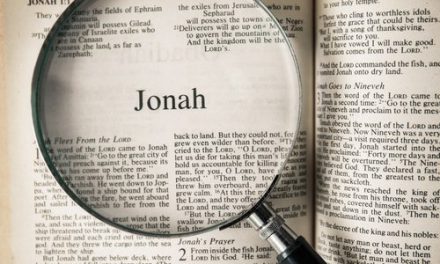
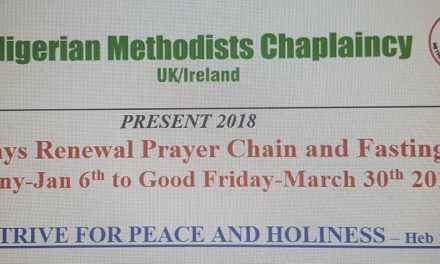

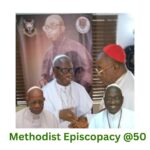
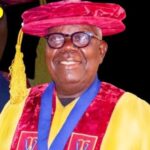

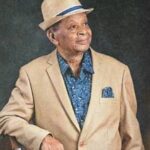
A very lucid account of stewardship and the background of the Deaconess order in MCN.We heartily congratulate our Mama, Deaconess Bisi Craig on this her landmark Birthday and pray for greater strength to continue the good work of the Ministry in good health and the joy of the Lord in Jesus’ name,Amen.
Worthy is the Lamb!